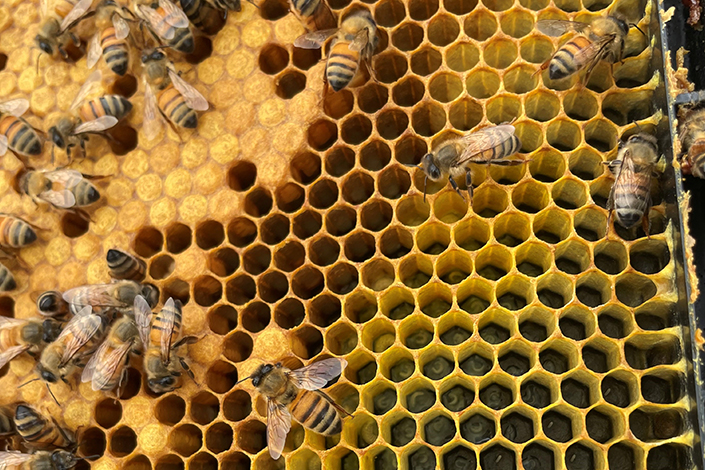Beekeeping in West Virginia
By Megan Bevins

Bees often go unnoticed as they fly, usually overlooked and sometimes feared. Yet, these tiny creatures, along with other pollinators like butterflies, birds and moths, are essential for the food supply. The U.S. Department of Agriculture (USDA) notes that they pollinate one in every three bites of food humans eat. Beekeepers play a crucial role in maintaining the health and preservation of these bee colonies.
In West Virginia, beekeepers are hard at work protecting the state’s many species of bees. While beekeeping is often seen as a hobby, it significantly contributes to the health of the state’s environment and agriculture.
Louisa Householder, president of the West Virginia Beekeepers Association (WVBA), explains that foods such as fruit, vegetables and almonds, which make up 90% of worldwide crops, require pollination to survive. Both commercial beekeeping and backyard beekeeping are equally important practices, as backyard gardens, trees and wildflowers need to be pollinated just as much as larger crops.
“Beekeepers’ large and small operations support agriculture through pollination of backyard gardens and commercial crop production,” Householder says. “Honeybees also support the livestock industry in a way by pollinating grasses such as alfalfa used to feed livestock.”
Part of the work of beekeepers includes combating threats that might harm the bee colonies. Householder mentions the current most common danger is the varroa mite, a parasite that feeds on honeybees. These mites are particularly harmful not only because they feed and reproduce on bees during their most vulnerable life stages but also due to the many harmful diseases they carry and spread.
According to the USDA, this includes deformed wing virus, which causes deformed and damaged wings on the bees, leading to an inability to fly and perform their duties in the hive. Other diseases include acute bee paralysis virus, kashmir bee virus and Israeli acute paralysis virus, which can be found in colonies of any size or strength.
Things like herbicides and pesticides used to control weeds and pests can also kill honeybees on contact. Householder says minimizing the use of these chemicals, especially while flowers are in bloom, can greatly help preserve the bee population.
Mark Lilly, head beekeeper and educator for the Appalachian Beekeeping Collective (ABC), highlights another challenge: the lack of education on the importance of pollinators to the environment and how small insects are affected by harmful practices.
Despite these challenges, the Mountain State’s natural landscape can serve as a great setting for beekeepers.
“Our main honey flows are different tree species,” Lilly says. “We are removed enough that big agriculture chemicals are only minimal in areas where they are used.”
Householder also adds that the state’s diverse floral sources, which provide nutrients in pollen and nectar that help keep honeybees healthy as well as moderate weather, aid in beekeeping practices.
One of the most notable aspects of beekeeping is the harvesting and selling of quality honey. Householder explains that to do this, beekeepers remove the honey supers that honeybees have stored in their hive and process it by shaving off the beeswax that seals the honeycomb.
“The frames of uncapped honey are placed in a honey extractor that rotates in a circular motion and flings the honey out of the comb onto the sides of the extractor drum,” she says. “The honey is then filtered through a fine sieve to remove wax pieces and other debris from the honey.”
After this, honey is considered raw, preserving its nutrients and enzymes, and can be bottled and sold.
The ABC and the WVBA, along with similar organizations throughout the state, promote beekeeping through education and community involvement.
The WVBA works hand in hand with the West Virginia Department of Agriculture to promote initiatives and hive products that advocate for the welfare of honeybees. The organization hosts members who gain a plethora of services like an annual honey show, informative newsletters and voting privileges during association meetings.
The ABC helps provide training, support and equipment to beekeepers in distressed areas. Lilly says the organization offers free online training and works with schools, from preschool through 12th grade, to supply educational information.
Beekeepers’ work is vital to the environment and agriculture, and through their efforts, West Virginia’s bees continue to thrive.








